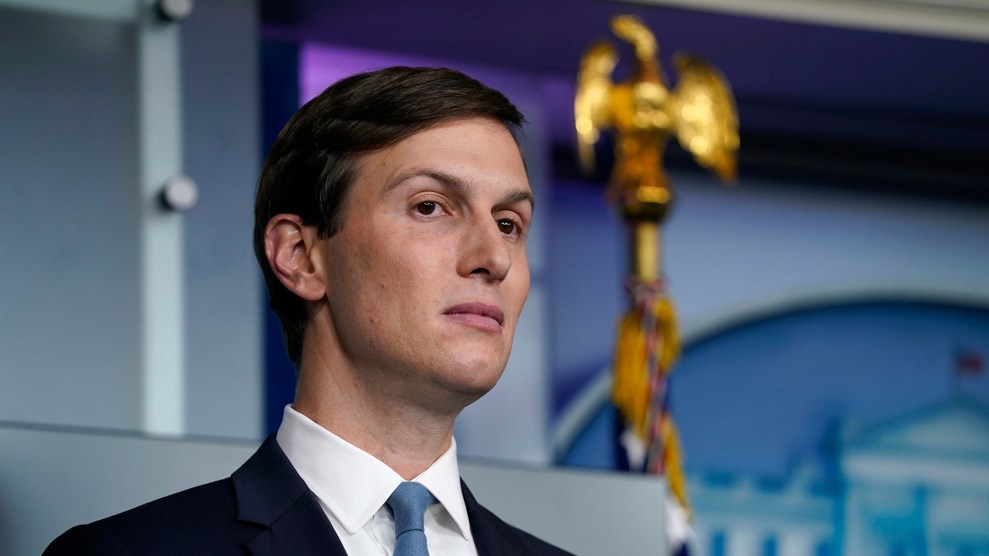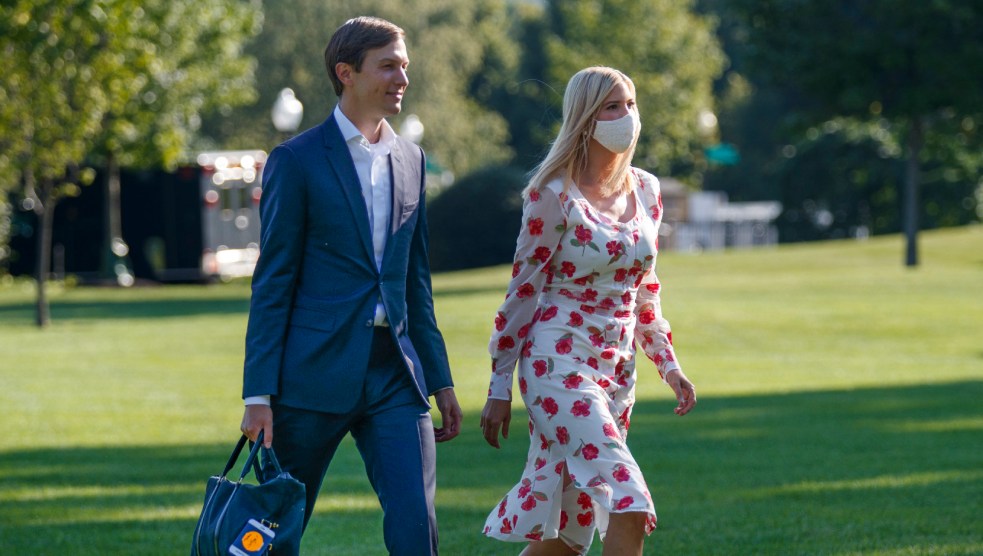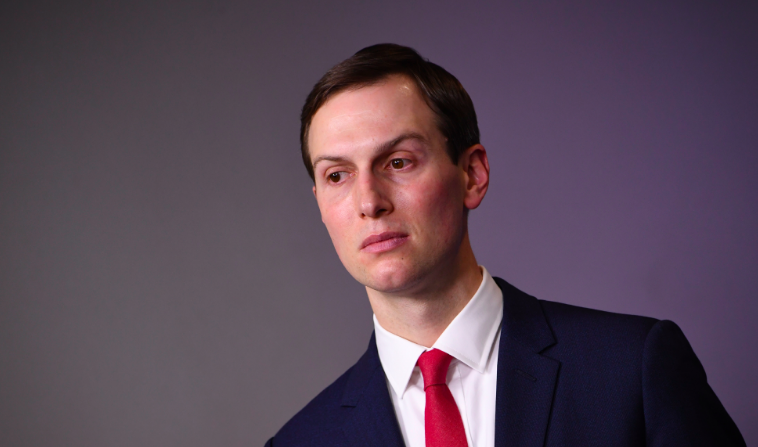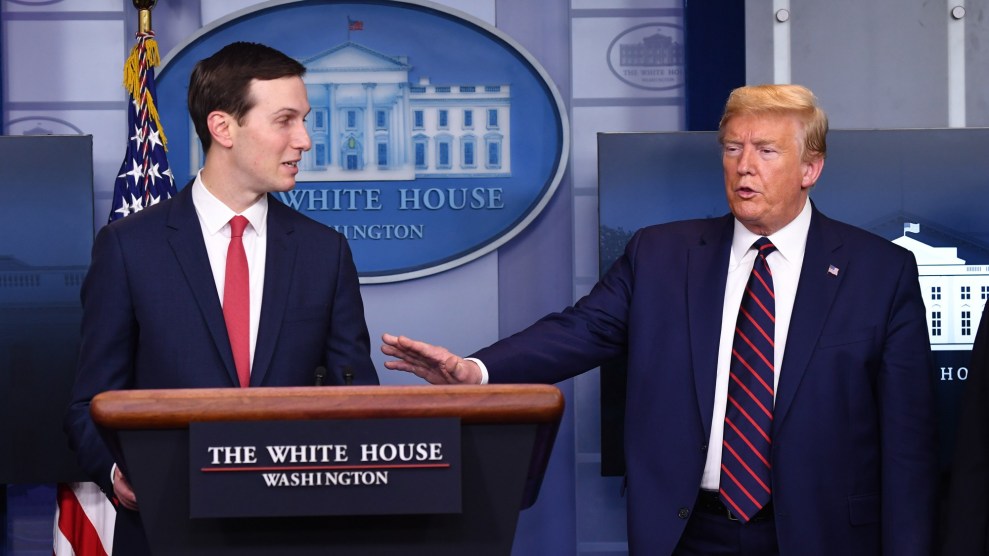
Jared Kushner listens during a news conference at the White House.Evan Vucci/AP
When the coronavirus hit, Jared Kushner became a key player in the Trump administration’s response to the horrific crisis that has claimed more than 200,000 American lives. At the start of the pandemic, Donald Trump’s son-in-law and top adviser pushed the view that the media were hyping the threat of the virus to damage the president. Still, he promoted a national testing system—with drive-through sites and a website (similar to one created by a business he was linked to)—that never came to be. Kushner pulled together a secretive shadow task force with members drawn from the private sector, and he recruited volunteers from investment and consulting firms to hand out government contracts for desperately needed medical equipment—and generally botched the job. At one White House meeting, Kushner reportedly declared, “Free markets will solve this. That is not the role of government.” And through this all, it has gone unnoticed that Kushner owns a large stake in a real estate company now poised to make money off the economic distress caused by the pandemic that Trump has been unable to tame. Moreover, this firm’s opportunity for profit may be enhanced by the Trump White House’s decision not to press for more widespread coronavirus economic relief.
As part of the $200–$783 million fortune he shares with his wife, Ivanka Trump, Kushner holds an ownership stake worth between $25 million and $50 million in Cadre, a real estate investment firm that he helped start in 2014 with his brother, Joshua Kushner, and Ryan Williams, a college buddy of Joshua. The company’s aim was to connect wealthy people and institutional investors directly to real estate deals. A 2016 profile of the firm described the company this way: “Cadre is a platform where approved sellers (‘operators’) can apply to post carefully vetted commercial real estate deals, from stores to apartment buildings to offices. A network of high-wealth individuals or ‘qualified purchasers’ who want to make real estate investments—but haven’t previously had access to deals—can drop $500,000 or more on individual properties.” The firm’s vision, according to Business Insider, was to provide an alternative to the more common use of real estate funds and allow direct investments in properties (or portions of properties) to make “the real estate market more like the stock market.” Its financial backers included Goldman Sachs, Silicon Valley mogul Peter Thiel, Chinese entrepreneur David Yu, and the family office of billionaire George Soros.
In its first years, Cadre’s listed properties were all in the United States, but it intended to expand to overseas markets. Its website currently notes that the firm only accepts investors with annual incomes greater than $200,000 (or $300,000 for a household).
Cadre—headquartered in New York City in the Puck Building, which is owned by the Kushner real estate company—obviously has a sharp interest in the ups and downs of the real estate market, and the company has been looking to exploit the current economic misery by investing in distressed properties, particularly hotels. In May, Bloomberg reported, Cadre was establishing “a new fund to seize on property-market opportunities that arise from the economic downturn in the wake of the coronavirus pandemic.” Soon after that, Dan Rosenbloom, Cadre’s managing director of investments, cited hotel deals as a possible path forward for Cadre, which, like many real estate companies, had been slammed by the pandemic and forced to cut staff and executive pay. “These opportunities are still three to six months away, until you start to see forced selling,” Rosenbloom told a trade publication.
On September 10, Allen Smith, president of Cadre, wrote on the firm’s website that the pandemic-fueled “deep distress” in the economy could create “opportunities” in hotels. “While a full recovery in the hotel sector will be difficult to predict until a vaccine is developed,” he wrote, “the near-term distress will present unprecedented opportunities.” He explained: “The ensuing distress should lead to opportunities emerging later in 2020 and early 2021 as forbearance agreements expire and there is a greater volume of loan sales, foreclosures, and owners seeking rescue capital to fix over-leveraged capital structures.”
The hotel industry has been hit especially hard by the pandemic, and its leaders have turned to Washington for help. As the White House and Congress considered additional coronavirus relief this summer, the American Hotel and Lodging Association, the leading trade group for hoteliers, requested an extension of the Paycheck Protection Program and specific relief to assist hotels struggling to meet their commercial mortgages. “If they’re not able to get something done, we’ll have a serious problem on our hands,” Chip Rogers, the group’s CEO, said. “As people stop taking vacations [in the fall], if there’s no business travel and a lot of forbearance and forgiveness—which is usually offered in 90-day terms—come due, expenses will go up, and revenue will go down in a scenario where many [hotels] are already struggling to break even.” But the GOP Senate adjourned in August without passing any new relief, and Trump’s White House, after issuing executive orders to extend federal unemployment benefits (at a lower rate) and implement a payroll tax break, has not made a new relief measure a priority. Hotel industry leaders have worried about a possible wave of foreclosures ahead.
According to Cadre, further dislocation in the hotel sector—”forced selling,” as Rosenbloom put it—could be a golden opportunity for Cadre and its owners, including Kushner. Which raises the question of whether Kushner’s stake in Cadre poses a conflict of interest. After all, he might well be involved in White House discussions regarding coronavirus relief packages.
This is not a new question. Kushner’s ownership of Cadre has long been a source of controversy When he became a White House official in 2017, he neglected to disclose his connection to Cadre—and many other business interests—on his financial disclosure form. At the time, the Wall Street Journal reported, “Ethics experts’ concern is that Mr. Kushner’s business connections could jeopardize his impartiality in certain areas and that, absent disclosures, the public is in the dark about potential conflicts.” After joining the White House, Kushner resigned from the board of Cadre but he held on to his ownership interest, though lowering it to below 25 percent.
Ethical concerns over Kushner’s passive investment in Cadre did not fade. In 2018, news outlets revealed that Cadre was trying to exploit Opportunity Zone low-income tax breaks, which Kushner and Ivanka Trump had helped enact and promote, and that the firm was doing so in hot-market neighborhoods, not underserved communities. The following year, the Guardian reported that Cadre “received $90m in foreign funding from an opaque offshore vehicle since [Kushner] entered the White House as a senior adviser to his father-in-law Donald Trump…The money came through a vehicle run by Goldman Sachs in the Cayman Islands, a tax haven that guarantees corporate secrecy.” This secret funding posed a problem. “It will cause people to wonder whether he is being improperly influenced,” Jessica Tillipman, a George Washington University law school lecturer, who teaches government ethics, told the Guardian.
In December, Kushner requested from the Office of Government Ethics a certificate of divestiture to sell his interest in Cadre (and avoid capital gains taxes), noting that his Cadre shares did pose a possible conflict. At the time, the top White House ethics officer determined it was “reasonably necessary” for Kushner to divest in order to do his job and “avoid a conflict of interest.”
In February, Bloomberg reported Kushner was selling his stake in Cadre. According to the business news service, in 2018, SoftBank, a Japanese investment company, had pursued an investment in Cadre but had asked for Kushner to divest. He didn’t and the negotiations ended. A Kushner spokesperson noted that Kushner’s involvement in the firm was indeed complicating its efforts to draw in new investors, including those overseas. (New foreign investments—possibly from China or Saudi Arabia—could raise conflicts of interest concerns.) And Cadre was reportedly willing to buy him out.
But this summer, Kushner put the brakes on the buyout, and his certificate of divestiture was withdrawn. According to Citizens for Responsibility and Ethics in Washington, a good-government nonprofit, this was the first time the Office of Government Ethics had pulled a certificate of divestiture. “When an official requests a CD, they ordinarily commit to divest the assets at issue,” CREW noted.
Bloomberg reported that Kushner’s Cadre sale was the victim of the pandemic: “Company executives started cutting costs as real estate prospects dimmed and fresh investments dried up. The deal was shelved.” And CNBC noted, “Jared Kushner made the decision as part of a private agreement he made with the company, according to people with direct knowledge of the matter. Kushner and the company put the divestiture on hold with the understanding that while he remains an investor, Cadre will not seek out foreign investors, these people said.”
This leaves Kushner still holding a large stake in a company that has signaled it is interested in capitalizing on economic calamity, particularly within the hotel industry. With Kushner continuing to operate as a senior adviser to Trump, as the president considers policy steps related to the economy, the potential conflict raised by his Cadre stake arguably has intensified since last December, when Kushner acknowledged a possible conflict. The hotel industry says it needs federal help to stay afloat. Cadre has indicated it is interested in hunting for hotels that go under. Kushner is involved with each of the competing sides of this equation. He could well personally benefit, if Cadre starts making a buck off hotels clobbered by the coronavirus that do not receive federal assistance. (Of course, Donald Trump, who still owns his real estate business, which includes hotels, has his own potential conflicts—but government ethics rules do not apply to the president.)
Kushner’s involvement with Cadre raises “two distinct types of ethics questions,” says Kathleen Clark, a law professor at Washington University who specializes in legal and government ethics. First, she explains, if Kushner benefits from his work at the White House—say, the advice he provides Trump on economic aid—a “criminal conflict of interest statute could apply.” But that would only happen if Kushner participates in a matter that applies directly to him, such as an issue that focuses on a particular industry.
“If Kushner participates in an economic initiative or decision related directly to the hospitality sector and if that could benefit Cadre and Kushner, [this criminal statute] could come to apply,” Clark notes. It would not, if the subject at hand was broader, such as lowering interest rates or overall tax policy. The second ethics issue, according to Clark, is whether Cadre, through Kushner, could benefit from inside or advance information regarding Trump administration plans.
“Kushner needs to either divest or recuse. Those are the only two options,” she says.
Will Kushner reboot his divestment of Cadre? Has he recused himself from administration deliberations that relate to the hospitality or real estate industries? Mother Jones sent a list of questions about Kushner and Cadre to the White House and to Kushner’s personal attorney. Neither responded. Cadre did not reply to a request for comment.
“Kushner is acting like the law doesn’t apply to him,” Clark says. “I don’t know where he would get that idea from.”


















